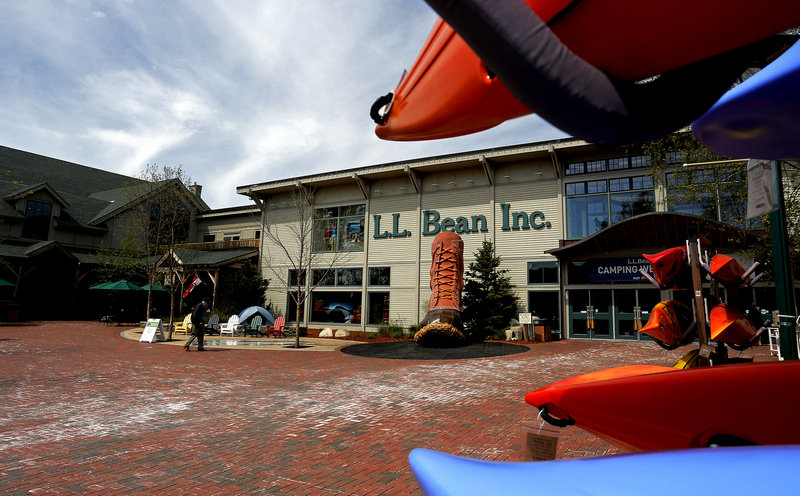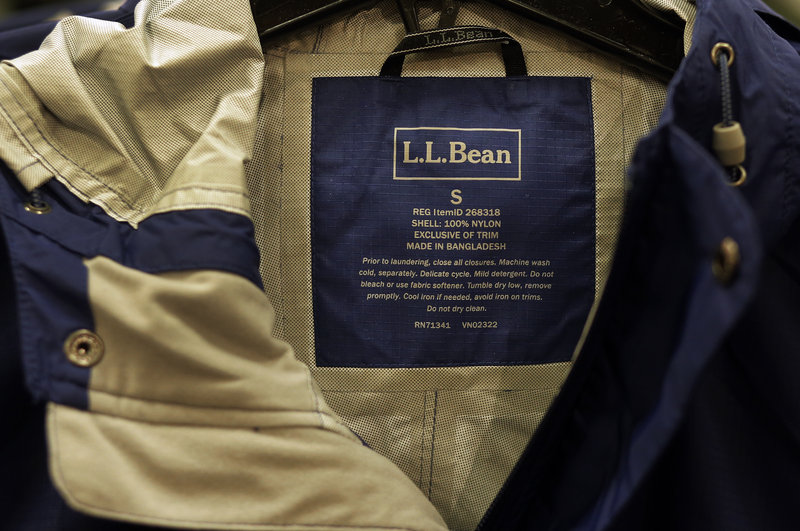L.L. Bean will not join the growing list of retailers that have signed a contract to make factory conditions safer in Bangladesh, a company representative said Wednesday.
Despite customers’ concerns about safety at its garment factory in Bangladesh after a building collapse that killed more than 1,100 factory workers in the country last month, L.L. Bean said its operations in Bangladesh are too insignificant for it to sign the pact.
The Freeport-based retailer uses only one vendor in Bangladesh, which produces a small amount of L.L. Bean-branded outerwear, said spokeswoman Carolyn Beem.
Beem issued a written statement to explain why L.L. Bean isn’t signing the five-year, legally binding Accord on Fire and Building Safety in Bangladesh, signed by some of the world’s largest retailers, including the Swedish chain H&M, Netherlands-based C&A, and British retailers Tesco and Primark.
“L.L.Bean works with one vendor who has a factory in Bangladesh,” the statement said. “As with all of our vendors, we work to ensure our products are produced in safe factories. All vendors must demonstrate a commitment to a strict code of conduct that sets out safety and labor standards.
“Because of our limited presence in Bangladesh factories, at this time we have not signed the Accord on Fire and Building Safety in Bangladesh,” it said. “Rather, we have worked directly with our vendor to ensure the highest standards of worker safety and fair treatment protocols are in place.”
The accord requires participating companies to do independent safety inspections, make their reports on factory conditions public and cover the costs of needed repairs.
It also calls for them to pay as much as $500,000 a year toward the effort, to stop doing business with any factory that refuses to make safety upgrades, and to allow workers and their unions to have a voice in factory safety.
L.L. Bean is not the only apparel maker to opt out of the Bangladesh accord. Several major retailers, including Walmart, have said the agreement is unnecessary and they will work on their own to ensure safety in the factories they use. Others have said they object to the legally binding nature of the agreement.
Many retailers have moved their manufacturing to developing countries like Bangladesh as labor costs in China have risen in recent years.
Bangladesh is now the world’s second-largest apparel exporter, after China, with about 4,000 garment factories paying workers less than $40 a month.
Beem said the manufacturer that L.L. Bean uses in Bangladesh is a large operation that does contract work for several clothing retailers. She would not name the manufacturer or say what percentage of L.L. Bean’s inventory it produces.
“We have visited this factory within the past year and again since the factory tragedies in Bangladesh,” Beem said. “This is a modern building and we are confident it meets or exceeds our high expectations for labor and safety standards.”
L.L. Bean has its own team of inspectors, who look at factories’ physical features such as fire exits and alarms, and their management policies and practices, Beem said.
Since 2005, at least 1,800 workers in Bangladesh’s garment industry have been killed in factory fires and building collapses, according to research by the advocacy group International Labor Rights Forum.
The two latest tragedies in the country’s garment industry have raised alarm about conditions in the Third World countries where most clothing is manufactured.
The building collapse on April 24 was the industry’s worst disaster ever, coming just months after a fire in another garment factory in Bangladesh killed 112 workers in November. Neither factory produced garments for L.L. Bean, the company said.
A check of clothing on the shelves at L.L. Bean’s retail complex in Freeport indicated that a small amount of its outerwear is made in Bangladesh, including the Ascent Gore-Tex Jacket, the Trail Model Raincoat and the Goose-down Vest.
The labels on most of the company’s other outerwear indicate the clothing is made in countries that include Thailand, Vietnam, Turkey and El Salvador.
Some L.L. Bean customers said Wednesday that improving workplace safety in Bangladesh is an important issue for them, but the company’s decision not to sign the accord won’t stop them from shopping there.
“It’s certainly going to make me look into what they’re doing,” said Susan Dorff, 28, of Pittsburgh. “I hope that they self-police, or that eventually they’ll be looking into something like (the Bangladesh accord).”
J. Craig Anderson can be contacted at 791-6390 or at:
canderson@pressherald.com
Twitter: @jcraiganderson
Send questions/comments to the editors.





Comments are no longer available on this story